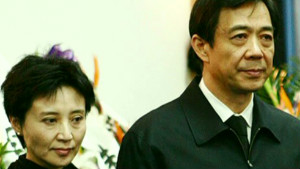Beijing (CNN) -- A Chinese court on Monday suspended the death sentence of Gu Kailai, the wife of a disgraced Communist Party leader, after finding her guilty of murder in the death of a British businessman, a court official said.
Gu's death penalty has
been suspended for two years due to her weakened mental capacity while
committing the crime and her close cooperation with police during the
investigation, according to Tang Yigan, deputy chief of Hefei
Intermediate People's Court.
"I think this verdict is
fair. It fully reflects the court's respect for law, reality and
especially human life," Gu said in video from Monday's court session
shown on state-run CCTV.
Her sentence is likely be
commuted to life imprisonment, if she doesn't commit any crimes during
the two-year reprieve, as is customary in the Chinese legal system. Her
punishment could be even further reduced for good behavior.
She was jailed immediately following the verdict.
Four police officers also
were convicted of covering up the murder and received prison sentences
ranging from five to eleven years, Tang said.
Gu and a former household aide went on trial August 9 on charges of poisoning 41-year-old Neil Heywood.
Near the end of that
day's court proceedings, she said according to state-run news agency
Xinhua that she "accepted all the facts written in the indictment" --
including poisoning the Brit at a time when she thought her son's life
was in danger.
At the time of Heywood's
death last November, Gu's husband Bo Xilai was the head of the
Communist party in the bustling southwestern city of Chongqing and an
influential and controversial member of the Communist Party's politburo,
the elite group of 25 men who run China. He is now awaiting his own
fate after being stripped of his political office earlier this year due
to an unspecified "serious breach of party regulations."
 Gu Kailai's links to the UK
Gu Kailai's links to the UK
 China's Jackie O Stands By Her Man
China's Jackie O Stands By Her Man
 China's Jackie O Stands By Her Man
China's Jackie O Stands By Her Man
 Will scandal bring change to China?
Will scandal bring change to China?
Gu's aide, Zhang Xiaojun, also was found guilty Monday in Heywood's death and sentenced to nine years in prison, Tang said.
The British Embassy in Beijing welcomed the Chinese investigation and the verdict.
"We consistently made
clear to the Chinese authorities that we wanted to see the trials in
this case conform to international human rights standards and for the
death penalty not to be applied," said John Gallagher, an embassy
spokesman.
"Our thoughts are with
Mr. Heywood's family during this distressing time. Consular officials
have attended the trial to fulfill our consular responsibilities to the
family and our focus remains on offering them all the support we can."
Neither Gu nor Zhang will appeal their verdicts, according to the court.
The verdicts were
announced at the Hefei Intermediate People's Court in the eastern
Chinese city where the trial occurred but about 1,250 kilometers (775
miles) east of the scene of the crime. The guilty verdicts were widely
expected, as a U.S. State Department report noted -- citing the Chinese
Supreme People's Court -- that Chinese prosecutors had a 99.9%
conviction rate in 2010 in that nation's first and second levels of
criminal courts.
Chinese authorities had
previously said that Gu and her son had "conflicts" with Heywood "over
economic interests" and that she was motivated to kill the Briton
because of fears for the safety of her son, Bo Guagua. Bo declined to
comment on his mother's confession or "any details pertaining to the
case." However, the day before the trial he told CNN he'd submitted a
witness statement to her defense team.
Prosecutors claimed Gu
had invited Heywood to Chongqing -- the bustling southwestern Chinese
city where her husband Bo was then Communist Party chief -- from
Beijing. The two drank alcohol and tea in a hotel room, after which the
British businessman got drunk and began vomiting, a prosecutor said.
When Heywood asked for water, Gu asked Zhang, who'd been waiting
outside, to come into the room.
It was then that Gu got
cyanide from Zhang and, after her aide carried Heywood to the bed,
poured the poison into the Briton's mouth, according to the prosecutor.
During those days last November, I suffered a mental breakdown after learning my son was in jeopardy.
Gu Kailai statement
Gu Kailai statement
Gu then scattered
capsules containing narcotics on the floor to make it seem like Heywood
was using drugs, the prosecution said. She put a "Do not disturb" sign
on Heywood's hotel room door and told hotel staff not to bother him, a
hotel employee said. He was found dead on November 15, 2011, in the
hotel room.
Speaking at the end of court proceedings, Gu referred to her worries about her son.
"During those days last
November, I suffered a mental breakdown after learning my son was in
jeopardy," Gu, 53, said then. "The tragedy, which was created by me, was
not only extended to Neil, but also to several families."
Her alleged
co-conspirator, Zhang, likewise admitted to a part in the crime and said
he wanted to say "sorry" to the victim's family.
"I hope the court can
give me a chance to take a new lease on life," Zhang said in the court
in the eastern city of Hefei, according to Xinhua. "I really know that I
did wrong."
The verdict was announced as the future of Gu's husband, once a rising star in Chinese politics, remains in limbo.
Bo, 63, had been widely
expected to get into the Politburo's nine-member standing committee --
the country's supreme decision-making body -- later this year, when the
Communist Party convenes for its once-in-a-decade leadership change.
In the sprawling
riverside megalopolis of Chongqing, the charismatic and urbane
politician Bo launched a "smash black, sing red" campaign that promoted
Chinese communist culture as zealously as it cracked down on organized
crime.
His economic policies,
which included millions spent on social housing -- garnered him rock
star status in Chongqing -- a fact that did not go down well with other
members of the party hierarchy. His populist policies and high-profile
personal style were seen as a challenge to the economically liberal and
reform-oriented faction within the Chinese Communist Party.
Bo's world eventually
came crashing down earlier this year when Wang Lijun, his handpicked
former police chief, tried to defect to the U.S. consulate in the
neighboring Sichuan city of Chengdu, triggering a political crisis that
rocked the leadership in Beijing.
Premier Wen Jiabao
obliquely reprimanded Chongqing's leadership over the Wang incident
during his annual press conference on March 14. Wen also referred to the
damage wrought by the Cultural Revolution -- a reference that alluded
to Bo's red revival in Chongqing -- and said that the city's stellar
economic performance had been the fruits of several administrations and
not just Bo's work alone.
The following day,
Xinhua announced that Bo had been dismissed as Chongqing party chief
and, almost a month later, he was suspended from the Communist party's
Central Committee and its Politburo ahead of an investigation. He has
not been seen in public since.
中国の裁判は仕組まれたショーのよう 薄氏妻の英国人殺害事件
2012.08.21 Tue posted at 17:15 JST
(CNN) 失脚した政府高官の薄熙来(ポーシーライ)氏の妻、谷開来(クーカイライ)
被告に、2年間の執行猶予付き死刑判決(減刑はほぼ確実)が20日に下されたことで、中国では過去数十年間で最も注目された裁判の1つはある種の結末を迎
えた。谷被告は、英国人ビジネスマン、ニール・ヘイウッド氏を毒殺したことを認めている。ヘイウッド氏には、同被告の息子と取引上のトラブルがあったとさ
れている。
今回の裁判は、被告人の社会的な地位の高さに加え、殺人や汚職、セックスまで絡んでいることから多くの耳目を集めたが、中国の司法制度についての新情報は何も提供していない。
中国の司法制度は、非常に政治的である。共産党は、不透明なプロセスで主要人事を決定している。裁判官に任期の保証は無く、いつでも解雇されうる。
裁判所は、財務面も含め地方政府の支配下にある。その多くが政府の役人である裁判所長は、審理には参加しないが判決に対して決定権を持つ。そして、通常は裁判に政治家は介入しないが、もし有力政治家の介入があれば、裁判所や裁判官は抵抗出来ない。
谷被告の裁判には、最高決定機関である共産党中央政治局常務委員会からの指令があった公算が大きいだろう。
谷被告の夫で、重慶市共産党委員会書記だった薄氏も、失脚前には常務委員会入りが取りざたされていた。そのため、今回の裁判は、法廷での証拠に基づいた裁判官の判断に任せるには、政治的にあまりにも重要であり、万全を期する必要があった。
今回の裁判は、被告人の社会的な地位の高さに加え、殺人や汚職、セックスまで絡んでいることから多くの耳目を集めたが、中国の司法制度についての新情報は何も提供していない。
中国の司法制度は、非常に政治的である。共産党は、不透明なプロセスで主要人事を決定している。裁判官に任期の保証は無く、いつでも解雇されうる。
裁判所は、財務面も含め地方政府の支配下にある。その多くが政府の役人である裁判所長は、審理には参加しないが判決に対して決定権を持つ。そして、通常は裁判に政治家は介入しないが、もし有力政治家の介入があれば、裁判所や裁判官は抵抗出来ない。
谷被告の裁判には、最高決定機関である共産党中央政治局常務委員会からの指令があった公算が大きいだろう。
谷被告の夫で、重慶市共産党委員会書記だった薄氏も、失脚前には常務委員会入りが取りざたされていた。そのため、今回の裁判は、法廷での証拠に基づいた裁判官の判断に任せるには、政治的にあまりにも重要であり、万全を期する必要があった。
薄氏は何をいつ知ったのか、中国の有力政治家は殺人を隠蔽(いんぺい)できるのか、といった疑問も排除しなければならなかった。
谷被告への量刑にも万全を期する必要があった。薄氏は、少なくとも降格前には非常に高い地位にあった。毛沢東後の政治指導部は、政治闘争の敗者を殺 しはしないという確固たる慣行を確立しており、その保護を、最低でも配偶者にまで広げるというのは指導部全員の利益に合致する。
谷被告への執行猶予付き死刑判決は予想通りで、通常は、2年後にほぼ例外なく終身刑に減刑され、最終的には、15年程度の刑期に短縮されることもある。
ほとんどの中国専門家は、今回の訴訟手続きは、政府公認のストーリー通りになるように厳密にコントロールされており、また、裁判開始以前に北京で判決内容が決められていて、訴訟手続きは一般大衆向けのパフォーマンスだと見ている。
中国の政治や司法制度には、ほとんど変化が見られない。
例えば、刑事裁判は通常、犯罪の発生地か被告人の居住地で行われるが、谷被告の裁判は、合肥市で行われた。重慶市には、潜在的な支援者が多すぎるというのが明白な理由で、政治的判断である。
谷被告への量刑にも万全を期する必要があった。薄氏は、少なくとも降格前には非常に高い地位にあった。毛沢東後の政治指導部は、政治闘争の敗者を殺 しはしないという確固たる慣行を確立しており、その保護を、最低でも配偶者にまで広げるというのは指導部全員の利益に合致する。
谷被告への執行猶予付き死刑判決は予想通りで、通常は、2年後にほぼ例外なく終身刑に減刑され、最終的には、15年程度の刑期に短縮されることもある。
ほとんどの中国専門家は、今回の訴訟手続きは、政府公認のストーリー通りになるように厳密にコントロールされており、また、裁判開始以前に北京で判決内容が決められていて、訴訟手続きは一般大衆向けのパフォーマンスだと見ている。
中国の政治や司法制度には、ほとんど変化が見られない。
例えば、刑事裁判は通常、犯罪の発生地か被告人の居住地で行われるが、谷被告の裁判は、合肥市で行われた。重慶市には、潜在的な支援者が多すぎるというのが明白な理由で、政治的判断である。
谷被告は、中国の法律に基づき汚職裁判に経験を持つ弁護士を雇おうとしたようだが、政府に拒否され、刑法の知識があるのかも分からない地元の弁護士に依頼するしかなかった。
中国の法律は、一般的には裁判の公開を求めており、今回の訴訟も公式には「公開裁判」とされている。しかし、傍聴人は慎重に選ばれており、公開裁判だとは全く言えないだろう。
この裁判から得られる教訓は2つある。1つ目は、中国の司法制度は、有力政治家が介入した場合には、政治に直接的に従属するという状況に変化は無いということだ。
2つ目は、この司法制度の現状が、中国社会に広く蔓延(まんえん)しているように見えるシニカルな雰囲気を引き起こしているということだ。中国の司法制度についてほとんど知識を持ち合わせていないような人でも、今回の裁判の結果として何か重要なことが決定されるなどと考えることはないだろう。
中国の司法制度における根本的な変化の兆候を待ち望んでいた人たちは、これからも待ち続けるしかないようだ。
中国の法律は、一般的には裁判の公開を求めており、今回の訴訟も公式には「公開裁判」とされている。しかし、傍聴人は慎重に選ばれており、公開裁判だとは全く言えないだろう。
この裁判から得られる教訓は2つある。1つ目は、中国の司法制度は、有力政治家が介入した場合には、政治に直接的に従属するという状況に変化は無いということだ。
2つ目は、この司法制度の現状が、中国社会に広く蔓延(まんえん)しているように見えるシニカルな雰囲気を引き起こしているということだ。中国の司法制度についてほとんど知識を持ち合わせていないような人でも、今回の裁判の結果として何か重要なことが決定されるなどと考えることはないだろう。
中国の司法制度における根本的な変化の兆候を待ち望んでいた人たちは、これからも待ち続けるしかないようだ。
沒有留言:
張貼留言